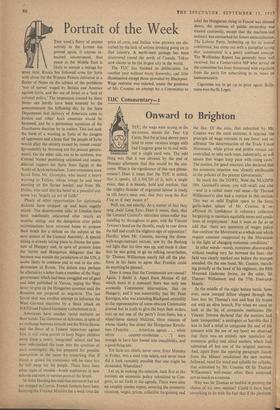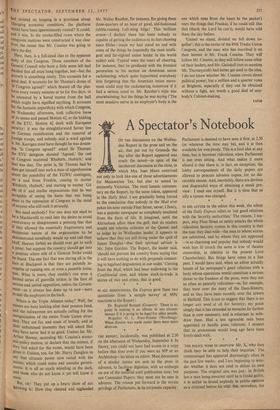TUC Commentary-2
Onward to Brighton
Well, no, not exactly. As a matter of fact they sang Auld Lang Sync. Does it mean, then, that the General Council's relentless steam-roller was standing by throughout in gear, with Sir Vincent Tewson's hand on the throttle, ready to roar down the hall and crush the slightest sign of opposition? Hardly; when Mr. Cousins, moving the down- with-wage-restraint motion, saw by the flashing red light that his time was up, and made it clear that he was going to go on talking nevertheless, Sir Thomas Williamson nearly fell off the plat- form in his haste to agree that Frankie could do anything he pleased.
Does it mean that the Communists are routed? Again, I doubt it. Apart from Motion 42 (of which more in a moment) there was only one avowedly Communist intervention, that on Hungary; and it was noteworthy that Mr. Peter Kerrigan, who was attending Blackpool ostensibly as the representative of some obscure Communist journal but in truth to give the boys their orders, sent up not one of the party's front-liners but a wheel-horse named McGree, three minutes of whose shabby lies about the Hungarian Revolu- tion ('Fascists . . . American agents . . . white terror . . . counter-revolution . .') were enough to have him booed into inaudibility, and a good thing too.
Yet facts are chiels; never once, from Monday. to Friday, was a card vote taken, and never once did it look remotely possible that one might be demanded. Wherefore?
Let us, in seeking the solution, look first at the motions on economic policy submitted to Con- gress, as set forth in the agenda. There were nine on roughly similar topics, covering the economic situation, wages, prices, collective bargaining and the like. Of the nine, that submitted by Mr. Cousins was the most extreme; it rejected 'the principle of wage restraint in any form' and re- affirmed 'the determination of the Trade Union Movement, while prices and profits remain un- controlled, to take such steps, industrially, as will ensure that wages keep pace with rising costs.' The motion, for good measure, also declared that the economic situation was 'directly attributable to the policies of the present Government.'
So much for the TGWU. Now the NUGMW (Mr. Gaitskell'S union, you will recall, and also —and in a rather more real sense—Sir Thomas Williamson's) also had a motion in this section. This was as mild English spam to the fiery, garlic-laden salami of Mr. Cousins. It re- aflirmed its 'confidence in _voluntary collective bargaining to maintain equitable terms and condi- tions of employment.' And it went so far as to add that 'there are questions of wages policy that confront the Movement as a whole and which require constant reappraisal by the Movement in the light of changing economic conditions.'
In other words—words, moreover, discoverable without reading very far between the lines—the field was clearly marked out before the trumpet sounded. On the one hand, Mr. Cousins, march- ing proudly at the head of his regiment, the 89th Mounted Gadarene Swine; on the other, Sir Thomas Williamson and the 57th Foot-and- Mouth.
In the middle of the night before battle, how- ever, some intrepid fellow slipped through the lines into Sir Thomas's tent and beat his brains out with an olive branch. For when we came to look at the list of composite resolutions (Sir Vincent Teivson declared that the motions had been 'composited,' a neologism so horrible that I was in half a mind to composite the seat of his trousers with the toe of my boot) we observed that there was an entirely new resolution on economic policy and allied matters, which had subsumed all but one of the original motions. And, apart from the opening paragraph (taken from the Miners' resolution) the new motion followed, word for word and syllable for syllable, that submitted by Mr. Cousins. Of Sir Thomas Williamson's well-meant effort there remained not so much as a comma.
Why was Sir Thomas so bashful in pressing the claims of his own motion? Could it have been something to do with the fact that if the platform had insisted on keeping in a provision about changing economic conditions' the platform Would have been ignominiously routed? It could; and it was. In the smoke-filled room where the composite motions were constructed it was clear from the outset that Mr. Cousins was going to carry the day.
Here, then, is a full-sized clue to the apparent tinny of this Congress. Those members of the General Council who have a little sense left had decided that all must hang together, lest—but the Proverb is something musty. This accounts for a good deal. It accounts for Sir Thomas's drone of Is Congress agreed?' which floated off the plat- form every twenty minutes or so for five days, to be answered by a bored mutter from the hall Which might have signified anything. It accounts for the fantastic soporificity with which Congress, on Wednesday afternoon, took collective leave of its senses and passed Motion 42, at the bidding of the ETU. Motion 42 dealt with European security : it was the straightforward Soviet line on German reunification and the removal of foreign troops, and nobody said a word against !t. Mr. Kerrigan must have thought he was dream- ing. 'Is Congress agreed?' asked Sir Thomas; the ETU delegates shouted 'Agreed,' the rest of Congress muttered 'Rhubarb, rhubarb,' and that was that. The point is, Sir Thomas had by then got himself into such a state of apprehension about the possibility of the TGWU contingent, on a nod from Frankie, ceasing to mutter Rhubarb, rhubarb,' and starting to mutter 'GU alit of it' and similar imprecations that he was incapable of seeing the harm that was being done to the reputation of Congress in the mind Of anyone who still took it seriously.
But need anybody? For one does not need to be a Machiavelli to read into the desire to avoid controversy or disagreement a pressing fear that If they allowed the essentially fragmentary and fissiparous nature of the organisation to be demonstrated somebody would up and call their bluff. Heaven forbid we should ever get to such a Point; but suppose the country should get into a Position where talk of a General Strike could be heard. The one fact that was staring all in the face at Blackpool is that they are patently in- capable of running one, or even a passable imita- tion. What is more, they couldn't run even a limited series of guerrilla strikes in the face of serious and united opposition, unless the Govern- ment—as it always has done up to now—were to stab the employers in the back.
Where is the Triple Alliance today? ,Well, the miners are busy looking after their pension fund, and the railwaymen are actually calling for the reorganisation of the entire Trade Union struc- ture. They are fat, and scant of breath; and in their unbuttoned moments they will admit that they have never had it so good. Useless for Mr. Arthur Horner, seconding Mr. Cousins's econo- nne-policy motion, to declare that the miners, if they had asked for the moon, would have been given it. Useless, too, for Mr. Harry Douglass to say that ultimate power now rested with the unions, which could make and unmake govern- ments. It is all so much whistling in the dark, and those who do not know it yet will know it soon.
But, oh! They put up a brave show of not knowing it! How they cheered and applauded Mr. Walter Reuther, for instance, for giving them three-quarters of an hour of good, old-fashioned rabble-rousing Left-wing bilge! This brilliant orator—I declare there has been nobody so capable of getting the audience to its feet cheering since Hitler—made my hair stand on end with some of the things he (reputedly the most intelli- gent and far-sighted union leader in the world today) said. Typical were the roars of cheering, for instance, that he produced with the frenzied peroration to his section on American union racketeering, which quite hypnotised everybody into forgetting that the American union move- ment could stop the racketeering tomorrow if it had a serious mind to. Mr. Reuther's style was overwhelming; but the things he was saying (The most sensitive nerve in an employer's body is the one which runs from the heart to the pocket') were the things that Frankie, if he could talk like that (thank the Lord he can't), would have told them the day before.
'United we stand, divided we fall down to- gether'; this is the motto of the 89th Trades Union Congress, and the man who has inscribed it on their banner is Mr. Frank Cousins. They will follow Mr. Cousins, as they will follow none other of their leaders, and Mr. Gaitskell (not to mention Mr. Thorneycroft) had better get used to the idea. I do not know whether Mr. Cousins covets direct political power; but a million and a quarter votes at Brighton, especially if they can be obtained without a fight, are worth a good deal of any- body's Cabinet-making.
TAPER



































 Previous page
Previous page